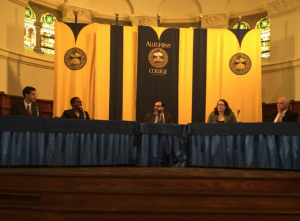Panel visits college to discuss American opioid crisis
Being a small campus, many of Allegheny’s buildings double from their intended purpose to serve space for larger events, such as talks, symposiums and banquets.
Ford Memorial Chapel participates in this often, and on Monday, April 9 at 4 p.m., the chapel lent its pews from its usual religious services to hold the panel “The Opioid Crisis, Business and the Economy.”
The panel consisted of Dionissi Aliprantis, senior research economist of the Federal Reserve Bank of Cleveland, Elisabeth Smith, president and CEO of Acutec Precision Aerospace, Mike Kelly, U.S. representative for Pennsylvania’s 3rd District and Denise Johnson, chief medical officer of Meadville Medical Center. Zachary Callen, assistant professor of political science, was the moderator.

Senior Research Economist of the Federal Reserve Bank of Cleveland Dionissi Aliprantis, Chief Medical Officer of Meadville Medical Center Denise Johnson, Allegheny College Assistant Professor of Political Science Zachary Callen, President and CEO of Acutec Precision Aerospace Elisabeth Smith and U.S. Representative for Pennsylvania’s 3rd District Mike Kelly sit at the panel during the talk in Ford Memorial Chapel on Monday, April 9, 2018.
After an introduction from Economics Major and Center for Business and Economics Fellow Samantha Bretz, ’18, and Allegheny College President James Mullen, the panel dove right into questions about the opioid epidemic, both in Meadville and across the nation.
Callen prefaced his questions by saying 116 people died of an opioid overdose every day in 2016, making the conversation both timely and necessary.
“It’s very important we have a sober workforce,” Smith said when asked how the opioid crisis has impacted her business. “Absenteeism, quality issues, lack of performance, really have a significant cost. We had one person we found subsequently had a drug issue, and that cost us over $30,000 alone in one complete scrap order.”
Johnson was asked about the best options in treating the epidemic from a medical perspective.
“This is a multi-mogul approach,” Johnson said.
She said medical assisted treatment is very important, but behavioral treatment is also very important because this is a long-term treatment. Following Johnson’s explanation of medical assisted treatment, Kelly explained the different types of addiction.
“There are two addictions,” Kelly said. “There is the physical addiction, which you can go to a clinic, you can go to a detox, you can go to a month long program, but while you were in the clinic, the disease was waiting for you in the parking lot. Because there is a mental addiction that takes place, far greater than the physical addiction.”
When asked if there is a way forward out of the opioid crisis, Aliprantis said first the opioid overdoses should not always be looked at as “deaths of despair.”
“Pain doesn’t vary across space, but prescription methods do,” Aliprantis said
He explained what he had seen in his research between how the U.S. prescribes opioids versus how countries in Europe do.
Aliprantis explained his research, which has led him to think that evidence of “deaths of despair” is not as strong. “Deaths of despair” is the name used to describe the link between “drug-related deaths and deteriorating economic conditions,” according to the New York Post.
“Looking at the recession, opioid use did not increase at all,” Aliprantis said. “Other very obvious drivers would be physician education practice, access to treatment, and simple things like shutting down pill mills.”
A point made by all of the panelists was there is not enough funding for other types of long term pain management. Johnson addressed this issue.
“Insurance covers medications, but not yoga,” Johnson said. “We know that physical therapy can be better than pain medications, but it is not well funded.”
When one audience member asked about the different types of drugs the Meadville Medical Center sees as gateway drugs in this epidemic, Johnson talked about prescription drugs.
“People addicted to heroin, they started with a prescription,” Johnson said. “Prescriptions are expensive, but heroin is cheap and easy.”
Smith added gateway drugs are not always prescriptions, as younger people are getting addicted to opiods.
Shannan Mattiace, chair of the political science department, said she was struck by how all the panelists were discussing the language of rehabilitation.
“When you look at the history of U.S. drug policy, it is not a discourse that in general has been focused on care and support,” Mattiace said. “It is quite overwhelming that there has been a strong discussion in our country about rehabitutive and harsh measures. But there has been a shift in language, in comparison to the 1980s crack epidemic.”
Johnson agreed with Mattiace, commenting on the breadth of the epidemic.
“By the sheer number of people affected, it is difficult to ignore,” Johnson said.
After the panel concluded, a great deal of people stayed behind to ask more questions, address concerns and thank the panelists for their time.
“The panel was very informative on the situation,” said Stephen Onyeiwu, professor and chair of the Economics department. “I like that they referred to it as an opioid epidemic, because it is an epidemic. But during the talk, I did not get a sense of what the solution to the epidemic is.”
Troy Elphinstone, ’19, also attended the talk and found both the questions and personal stories to be interesting parts of the panel.
“I thought it was fantastic how business owners, people working in the federal reserve, politicians, people from the Meadville Medical Center, all brought a lot of perspectives,” Elphinstone said.
He also talked about the different questions and stories that made the panel interesting.
“There were a lot of good questions from the panel and a lot of personal stories. In parts, it was really sad, but to be able to come together with a lot of differing opinions and at least be able to talk about things is a really good thing,” Elphinstone said.








